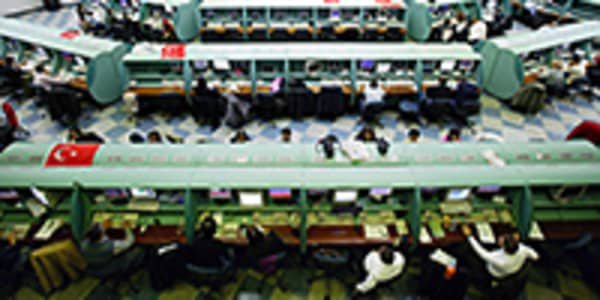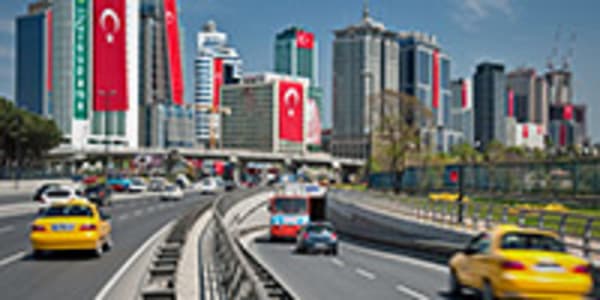Natural gas and crude oil pipelines crisscross the Turkish landscape, connecting Mideast suppliers with European customers. Someday, if Turkey gets its way, nuclear power plants will instead dot the land – and they’ll supply most of the energy needs of the fossil-fuel poor country, whose economy now ranks 17th globally.
Surrounded by oil and gas behemoths such as Russia and Iraq, Turkey’s role as a bridge betweenAsiaand Europe has contributed greatly to its economy — but done nothing for its energy security.
In that context, the government’s goal to build as many as 16 nuclear reactors and four power plants in a land where much of the territory is vulnerable to earthquakes actually seems like a straightforward solution. The complication, however, lies in how the government dishes out the contracts: Turkey needs to avoid over-dependence on Russian technology and money, while not shutting out the U.S. and other major nuclear players.
[MORE ON CNBC.COM… Slideshow: Investing in Turkish Art]
“Turkey wants to be self-sufficient in energy,” says Jack Goldstone, a professor at George Mason University. “It’s developed a very thoughtful strategy.”
The government of Prime Minister Recep Tayyip Erdogan, sees the nuclear program as both a means and an end, experts say. Along with providing security, it will cut energy imports and the current account deficit, a source of inflation in a country that’s had its share of that problem. As a result, the program has attracted the attention of the International Monetary Fund, to which Turkey still owes money from its troubled times a decade ago.
It will also help fuel another leg of economic expansion in a country with one of the best GDP growth rates over the past decade, and contribute to Turkey’s goal of joining the world’s top-10 economies by the 100-year anniversary of the republic’s founding in 2023.
“Turkey considers itself one of the next big players,” says Carina O’Reilly, a political analyst for IHS in London. And for Turkey, an original member of NATO and the OECD, the nuclear build-out involves financial and diplomatic challenges in the rapidly evolving balance of power in the global economy.
“It’s ambitious,” says Bulent Aliriza, director of the Center for Strategic and International Studies’ turkey project. “The new Turkey is ambitious.”
[MORE ON CNBC.COM: Investing in Europe’s Fastest-Growing Economy]
Several Turkey watchers expressed skepticism about whether the plan will be fully implemented. Turkey is also pursuing other energy sources, such as hydroelectric, wind and solar power, but they offer significantly less capacity.
The success of the nuclear program turns on achieving a balance of trade of between Russia, Turkey’s largest single-nation trade partner and energy source, the U.S. and Europe, which holds the key to Ankara’s admission to the European Union.
Russia won the contract for the first plant in 2010, after a breakdown in the 2008 tender process involving about a dozen interested parties. Their identity is not known, but they are thought to include major nuclear construction players in the U.S., Canada, France, Japan, China, and South Korea.
The plant, located in the province of Mersin on the southeast Mediterranean coast and near an earthquake-prone, will have a final generating capacity of 4,800 MW, will provide about one-tenth of Turkey’s total installed power generating capacity, and cost $20-25 billion.
“There were issues of transparency and pricing,“ says Gareth Jenkins, an expert on Turkey with the Central Asia-Caucasus Institute at Johns Hopkins University. “They could have gotten a lot of bids.”
Though the circumstances are unclear, a subsidiary of the Russian state-owned nuclear company Rosatom cinched the deal to build and operate the plant.
“The Russians went into it as a strategic decision,” says Jenkins, who’s lived in Turkey for two decades.
Turkish experts familiar with the process say it will be a money-losing endeavor.
“I think they [Turkish officials] were looking for the people who would give them the most technology with the least restrictions,” says Goldstone of George Mason University, who believes Turkey is not wedded to its nuclear program.
A contract for Turkey’s second plant — in the province of Sinop on the Black Sea — is expected to be signed in the next couple months, according to the government. Russia, China, Japan and South Korea are on the short list.
One plant is not a great loss for any of the commercial developers, but in the wake of Japan’s Fukushima Daiichi meltdownin 2011, sources say the US nuclear renaissance has slipped into a slower gear, limiting opportunities for American players. That makes Turkey’s plan more attractive now than during the bidding phase of the first plant.
The majority of the 60 reactors under or nearing construction in the world are in Russia, China and South Korea, according to the World Nuclear Association.
“It is an opportunity,” says Neff of IHS.
All the major US players — Exelon , Southern Co. — and joint ventures General Electric-Hitachi and Westinghouse-Toshiba — had little or no comment.
A U.S. spokesman for GE Power, whose parent company has been doing business in Turkey since 1948, said only that the company was “monitoring developments.”
Southern Co. — whose Georgia Power subsidiary CEO W. Paul Bowers visited Turkey in June — said it also is following developments and may be interested in sharing best practices at some point.
A representative of the industry trade group said members had not mentioned it yet, but there would surely be interest if the third and fourth plants became certainties.
If so, the outcome of the contract competition depends on a number of factors.
“The problem is that you have state companies from Russia, China, South Korea and even France,” says Neff of IHS. “You have an alignment of interest between the government and corporate side. The government comes in and offers financing. You have a political deal, then a commercial one. The U.S. is different. Why would they want to wait for all the strings from the U.S. if the Chinese, for example, are willing to throw money at it?”
That probably describes how Russia secured the first contract, say observers, and there is some concern the second one may happen the same way.
[MORE ON CNBC.COM: Investing in Europe’s Fastest-Growing Economy]
There’s also some question about whether the US-Turkey relationship. Even though there are many US multinationals operating in the country, direct investment has been modest and diplomatic relations have had their ups and downs.
Analysts say there is also an anti-Western antagonism among Erogan followers, particularly the middle class, who have been able to embrace their Islamic roots after years of suppression by military-influenced governments.
“Turkey’s been excluded on the margins of the West, and likes the idea of cozying up to Russia because it’s not the West,” says Jenkins of the Central Asia-Caucasus Institute, who finds the geopolitics of the nuclear-plant contracts “worrisome to a certain extent.”
At the same time, experts say Turkey is merely exercising its long-established neutrality while flexing its newfound trade muscle.
“Turkey is compartmentalizing its relationship with Russia, NATO, and the U.S.,” says Aliriza of the CSIS.
The E.U., Russia, China, U.S., Iran and Iraq are its top six trade partners. Likewise, Turkey opposed the U.S. invasion of Iraq in 2003 but agreed to the 2012 U.S.-EU Iran oil embargo (although it was granted an initial temporary exemption).
After a disappointing, fractious and fruitless early attempt at EU membership for much of the past decade, Turkey diversified its options, and trade was a good way to do it.
“It’s important to keep their options open,” says Goldstone of George Mason.





